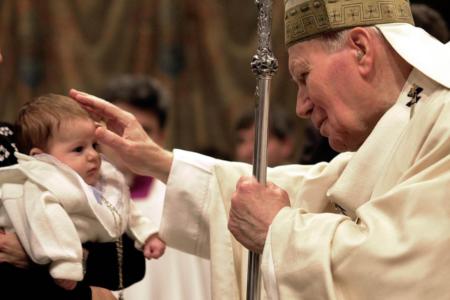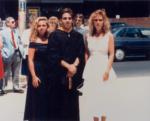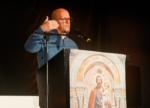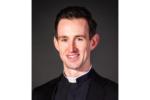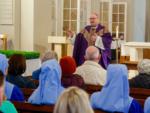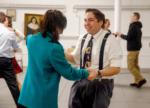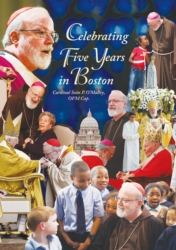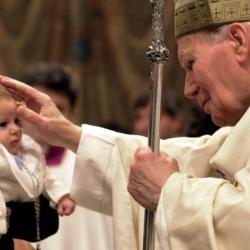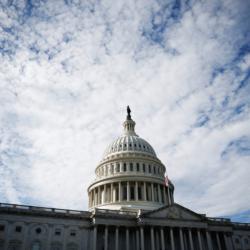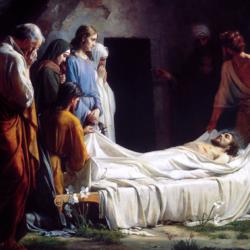Cardinal O’Malley discusses past decisions, challenges ahead
BOSTON -- In his first five years as archbishop of Boston, Cardinal Seán P. O’Malley has faced many challenges and has often responded with creative decisions to deal with a wide variety of issues. In this excerpt from his Aug. 2 interview with The Pilot the cardinal was asked to reflect on the rationale behind some of those decisions and to elaborate on his key objectives for the future of the archdiocese.
Q: In this first part of the interview, I would like to focus on your decision-making process as you dealt with a large number of very serious and contentious issues.
As soon as you arrived in Boston, the dynamics of the conversations to arrive to a settlement agreement with the lawyers representing a very large number of victims of sexual abuse changed. In six weeks, an agreement was reached. Why was it important for you to close that chapter so soon?
Cardinal O’Malley: Well, I was convinced that by dragging the process out it just caused much more pain to the victims and their families and to the entire Catholic community. I don’t think that anything was to be gained by turning this into a long legal battle. We recognized that the Church had made serious mistakes and needed to redress those by indemnifying the victims of sexual abuse and so I was anxious to do it quickly; I felt as though it was dragging on too long.
Q: One of your first decisions was to appoint a new archdiocesan lawyer to handle all the cases related with the scandal. Some saw that as a very bold move...
Cardinal O’Malley: I think it was necessary to respond quickly. People were anxious for a new archbishop to come and sort of take control of the situation.
I was aware, even from the time that I was told that I was coming to Boston, that the Holy See wanted me installed within three weeks. This was unprecedented and I too realized that the situation was very urgent and it demanded quick action.
I had experience with the attorney [Thomas H. Hannigan Jr.], and with an approach that I thought was fair and at the same time very respectful of the victims and their families, so we tried to replicate what had been successful in one of my former dioceses and it worked.
Q: When you arrived, you also announced that the archbishop’s residence would move to the Cathedral of the Holy Cross and that the former residence would be sold. Why?
Cardinal O’Malley: The sale of the house was sort of a corollary of [the settlement] in order to be able to demonstrate to the people where the money came from so as not to be using parish funds. The parishes were already in a very bad way, many of them.
I felt as though the house was a symbol of an immigrant Church that needed symbols of prestige in the past but that symbol today was a relic of the needs of another generation of Catholics.
Beyond just the symbolic meaning, it also allowed us to have the financial possibility of settling so many of these sexual abuse cases. I think in general people supported the decision; I know that for some it was hard to give up part of our patrimony.
In my own mind, the fact that we were selling it to a Catholic college [Boston College] made it more palatable.
Q: Another distinct moment in which you made a surprising decision was in October 2004, when, six months into the reconfiguration process you paused the process and put in place a committee--the Meade-Eisner committee--to look at the process and to make recommendations that, in fact changed the results of reconfiguration. What led you to do that? What was the key reason why you decided to pause, review and then change?
Cardinal O’Malley: [The reconfiguration process] was not going well. I’ve always felt that the timetable was too ambitious, but people in the chancery and the priests’ council felt as though we needed to do things quickly so as not to drag the process on too long.
I was never entirely comfortable with that but I accepted those recommendations, and when I saw that it wasn’t working, I tried to slow it down by having a review. I think that there was a lot of good will but I think that people did not understand how difficult the process was going to play in some parishes.
If we had not done [the reconfiguration process] there’s no way we could have saved our lay pension fund. Also, many of the parishes were unable to pay their expenses. Right now we would be in a terrible personnel crunch. So there were very serious reasons and I think that people understood that.
Closing parishes is always the most painful thing that you can do and had it been a decision that was for my benefit, I would have said, “Well, let’s not put ourselves through all this grief”--because it was torture--but it was a decision that I felt had to be made for the good of the Church.
Q: In 2005 you promised to open the archdiocesan financial books in ways that were unprecedented for a diocese. Why?
Cardinal O’Malley: Well, I was anxious for the Catholics of the archdiocese to have a very clear picture of what our finances were. The Church’s finances are--in my mind--not something that is simply the purview of the bishop. All the Catholics [of the archdiocese] should be aware of what our expenses are and what the needs are for the Church to be able to carry on her mission.
So, at a time when we were asking Catholics to be generous, I thought it was very important that we share with them what our situation is, and to let people know that there aren’t any secrets, we’re not hiding things, there’s no hidden pot of gold, we’re not wasting the resources that are given to us. My hope was that by sharing this information that it would inspire people to have greater trust in the administration of the Church’s goods.
We were so fortunate to have many outstanding lay people come forward and help with the process. Jack McCarthy [a principal at Harvard University’s Hauser Center for Non-profit Organizations] and others just spent an incredible number of hours working on this.
In today’s world it’s very important that people have confidence that the Church takes seriously its responsibility to be the guardian of this patrimony and to use it wisely to forward the mission that Christ has entrusted to us.
Q: Did you get any reactions from other bishops, other people saying “What are you doing?”
Cardinal O’Malley: I tried to give other bishops a heads-up as to what we were planning in Boston. Not every diocese was suffering the great crisis of confidence that we suffered here, nor were they experiencing the kind of deficits and challenges that we faced.
If everything is going fine in a diocese, the people are probably not that curious, but in Boston I think people were very concerned and so I wanted to give them as much information as we could to help people appreciate where we were and hopefully help us on the way to recovery.
Q: You also had to deal in creative ways with your health care system, even unsuccessfully trying to link it with a national Catholic health care system...
Cardinal O’Malley: To me the important thing was to preserve Catholic health care in Massachusetts. When I came, the hospitals were losing incredible amounts of money and I brought in a consultant who told me that in five years there would be no Catholic hospitals.
We took the determination of getting a new CEO who helped in the process of turning things around. But our commitment is to Catholic health care, whether it be diocesan or not. There are very few diocesan systems left, although one-fifth of the hospitals in the country are still Catholic hospitals.
I was very anxious to preserve this heritage and ministry that has been an important part of the history of the archdiocese, but looking for the best way to do that, and certainly one of the ways that we contemplated was the possibility of joining one of these large Catholic health care systems.
I think that still might be a possibility for the future, but the hospital situation has improved drastically. It doesn’t mean that there aren’t great challenges for all hospitals in Massachusetts. I’m very pleased that at this moment I think we’re in a good place and we have the possibility of a very good future going forward.
Q: In 2006, you asked Catholic Charities to abandon the adoption business because of the state’s imposition to force agencies to give children in adoption to same-sex couples...
Cardinal O’Malley: It’s my belief that the services of Catholic Charities need to reflect our Catholic faith, and the adoption of children to same-sex couples flies in the face of what the Church teaches about marriage and about family.
In order to preserve the integrity of Catholic Charities I had to make the very sad and painful decision that we would not continue to do adoptions because it was quite obvious that, unfortunately in Massachusetts, there is not enough religious freedom to allow us to carry on our mission that we’ve done for 100 years in accordance with the precepts of our faith.
In light of that, rather than allow an entire agency to be savaged, I decided that it was better to step away from adoptions and to do that as a way that we say to the world that the services of Catholic Charities need to reflect what is our faith.
The whole debate on same-sex marriage unfortunately has been reduced to prejudice against homosexual people. That is not what the Church’s teaching is about, but in this climate it is impossible for people to engage in a serious discussion of what the implications are for children, and I think it’s very sad and a great disservice that’s been done to the Catholic community by the very aggressive agenda of the media and of some of our politicians.
Q: In a surprising move, you showed up at the Nunciatura in Washington with five survivors of abuse from Boston so the Holy Father could get a personal impression of the pain of the abuse...
Cardinal O’Malley: Well, we felt that it was very important for the Holy Father to experience firsthand an encounter with some survivors of sexual abuse so that he would be able to express to them his heartfelt sentiments about this great tragedy in the history of our Church.
I think the fact that he was unable to come to Boston was interpreted by some people as hesitancy on his part to face the sexual abuse crisis. I was very pleased that the Holy Father allowed us to meet with him and that he addressed the issue in a very forthright way during his trip.
We were anxious to keep the whole encounter under wraps, as it were, because we didn’t want it to turn into a big media event beforehand and make it more difficult for the victims. We didn’t want to put them unnecessarily in the center of a maelstrom.
Some of them were very happy to share their experiences with the media, others wanted to be more discreet and we wanted to respect that. I think that the visit enhanced the Holy Father’s visit to the United States and also dispelled the idea that he was avoiding Boston, which to me was a very important thing.
I’ve always felt his support for the Archdiocese of Boston; some people thought that he wouldn’t name a cardinal in Boston to punish the Church here, something like that. This is all absurd. The Holy Father is very concerned and has strived to be very supportive of the Church here.
Q: Let’s focus now on some of your stated priorities.
You are showing great interest in developing new evangelization strategies and welcoming into the diocese ecclesial groups and initiatives that strive to announce the Gospel to Catholics and beyond. What is the urgency?
Cardinal O’Malley: Well, I think “business as usual” is not working and we need to be creative and bold in the way that we present the Gospel. There’s a great hunger for spirituality on the part of our people and events like the Men’s and Women’s Conferences that were geared to establishing men’s and women’s groups in the parishes...we’ve seen this as a way of trying to strengthen our parish life. The same with ARISE, we hope it will give people an opportunity for faith formation, for outreach toward inactive Catholics and hopefully prepare a larger pool of volunteers to be helpful in the parish mission.
We’re also looking very closely at the teaching of the faith in our religious education programs to see how we can mentor young people in the faith better than we have been able to in the past. When family life was very strong, the locus for religious formation was very much family-centric and as that structure has been weakened, the Church must look for new ways to support families and help them pass on the faith to new generations.
Q: Can you elaborate on those “new ways”?
Cardinal O’Malley: I feel as though we’re not doing a good enough job as a Church in the United States to mentor our young people in the faith.
With the present challenges that we have in the family life--the culture that is often very hostile to the values of the Gospel--it’s going to take a greater effort to introduce our young people into the beauties of the Catholic faith as a way of life.
We’re looking very closely at the materials that we use in all of the schools and the CCD programs and we try to identify best practices throughout the country, trying to identify programs within the archdiocese that have been the most successful in teaching young people about the faith.
We’re also very anxious to connect religious education with youth ministry so that people will not see catechesis as simply a classroom exercise but as something that prepares us for life. So at the same time we’re looking at programs to train lay ministers and to try and prepare people to be a part of this process of handing on the faith.
Q: Modernizing and strengthening the mission of Catholic schools is another of your stated priorities.
Cardinal O’Malley: Religious education programs allow us to have 20 or 30 hours a year with our young people and that’s not enough. We need to improve those programs, but in the Catholic schools we have an opportunity to help our young people have a greater knowledge of the Church and an experience of faith community and a sacramental life that will prepare them to live their faith more intensely.
The Church has trained many millions of Catholics, particularly from immigrant working class families, the Church has given them an excellent education. That tradition is something that requires sacrifices on our part and we’re asking the Catholic community to step up to the plate.
We have been the beneficiaries of the sacrifices of Catholics who went before us. What are we going to do for the Catholics of the future? We want to preserve these institutions and deepen their Catholic identity and make them schools of excellence for new generations of Catholics.
Q: But many Catholic children are educated in public schools...
Cardinal O’Malley: The public schools, when I was growing up, were very Protestant and it was very difficult for Catholics in that atmosphere, so the bishops in the part of the country where I was from insisted that we all go to Catholic schools.
Today the public schools are no longer Protestant, but they are not very religion-friendly. As the society has become more secularized, in fact, sometimes what they teach in the schools is very hostile to religion. This is of great concern to us and should be a great concern to Catholic parents, because we know that no matter how hard we work to promote Catholic schools, the majority of our children will always be in the public schools.
Q: What are the challenges the Church faces to continue with the mission to announce the Gospel?
Cardinal O’Malley: As we look at the shrinking number of clergy, it implies the need for better training for our lay ministers and the need for more deacons in the diocese. Certainly our renewed efforts in promoting vocations have paid off. There are wonderful people helping in the vocation ministry.
Marriage as an institution has been greatly undermined in American culture and we know that it’s the building block of society as well as of the Church.
Therefore, going forward, two of our great goals are to instill in every Catholic a sense of personal vocation that God is calling you to friendship, to holiness, and to a particular way of life, and at the same time to help our Catholics to feel part of a universal communal mission that has been entrusted to us as a body, as a people.
The present culture is so individualistic that some people see religion only as something very personal rather than as being a part of the body of Christ and having a mission to announce the Good News and build a civilization of love in today’s world.
So, those are two of the great challenges that we face.
Q: How do you see the role of the Church in society?
Cardinal O’Malley: I think that as we strengthen people’s personal conversion we help to equip them to be able to bring the values of the Gospel to their profession and public life.
The teachings of the Church have a great consistency among them. [Our aim is] to help people understand how they intersect and how they are all part of a whole.
For instance, sometimes conservative Catholics are very faithful to the Gospel of life and sexual morality but a little less concerned about economic justice and racial justice and some of these other things. And the liberal Catholics embrace the Church’s teaching on capital punishment and war and things like this, but want to play down what the Church teaches us about sexual morality or abortion or euthanasia.
To help our Catholic people to see that it’s all one Gospel and that our striving to respect the dignity of the human person intersects in so many of these issues and our call to promote the common good and to be able to make sacrifices for it in a world that is so individualistic and materialistic is a great challenge, but if people really come to embrace the whole Gospel, then it will strengthen the way that the Church will have an impact on the larger society.
Q: Would you like to add anything else?
Cardinal O’Malley: As we talk about the last past five years being here, it is not about me, it is not about the archbishop, but it is about the Church, about the community of faith, about all of the people who are trying to witness to the resurrection of Jesus Christ in the way they live their Catholic faith and contribute to the good of the Church.
I’ve tried to do my part but I don’t think that it’s about the archbishop but about Christ. When St. Paul had that encounter with the risen Christ on the road to Damascus, he was persecuting the Church and Jesus said, “Why are you persecuting me?” To persecute the Church is to persecute Jesus and to love the Church is to love Jesus. I think sometimes we can become too focused on the bishop or the hierarchy or the pope. We are here at the service of Christ.
Sometimes we do a good job and sometimes we do a lousy job but Christ is the same and I don’t think we should allow it to become a distraction. We must focus on the Lord and our fidelity to him. He’s given us the structures of the Church, they are holy for us, but they are important because they are from Christ.
